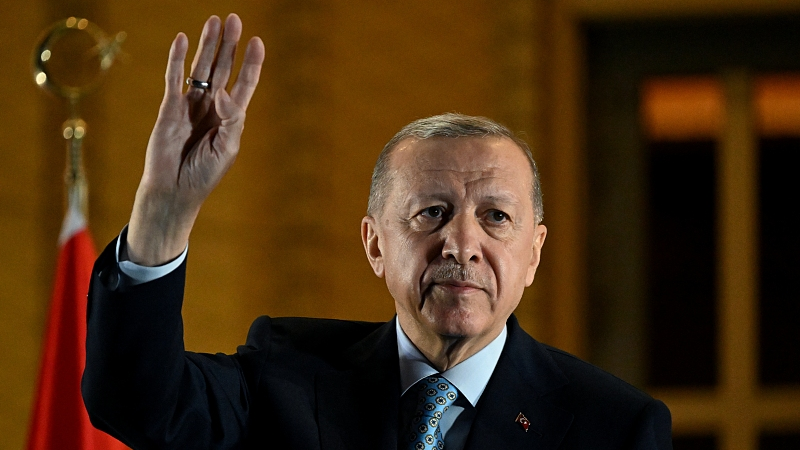
Turkish President Recep Tayyip Erdogan addresses his supporters following his victory in the second round of the presidential election at the Presidential Palace in Ankara, Türkiye, May 29, 2023. /CFP
Turkish President Recep Tayyip Erdogan addresses his supporters following his victory in the second round of the presidential election at the Presidential Palace in Ankara, Türkiye, May 29, 2023. /CFP
Editor's note: Bobby Naderi, a special commentator on current affairs for CGTN, is a London-based journalist, guest contributor in print, radio and television, and documentary filmmaker. The article reflects the author's opinions, and not necessarily the views of CGTN.
President Recep Tayyip Erdogan won Türkiye's presidential election on May 28, extending his power for a third term by defeating opposition leader Kemal Kilicdaroglu.
Erdogan's position as the nation's longest-serving leader, after an unprecedented runoff vote that defied his political downfall, reflects Türkiye's stark and persistent political polarization. With that in mind, the Middle East and important international entities like China, NATO, and the United States will all be affected by his re-election, in addition to Türkiye's foreign policy and other countries in the region.
Assertive foreign policy
The geopolitical significance of Türkiye cannot be overstated. It sits at a significant intersection between Central Asia, the Middle East, and Europe. It is positioned as a growing middle power on the international scene due to its advantageous geographic location, a democracy that is dominated by Muslims, and a thriving economy.
Türkiye understood the benefits of soft power diplomacy in an era dominated by American military and economic might, much like China did with its "soft rise" approach. It implemented a policy of "zero problems with neighbors," under the direction of former Foreign Minister Ahmet Davutoglu, with the goal of establishing a Turkish sphere of influence through balanced power politics.
Under the Justice and Development Party (AKP) administration, Türkiye's foreign policy strategy has been centered on mending frayed ties with its neighbors. With Iraqi Kurdistan, the nation has actively sought détente, which has improved economic and political ties. The country has shown a willingness to support regional stability by its efforts to resolve long-standing disputes with Greece and Syria, notably by looking into possible mutual military reductions and resolution of the Syrian refugee crisis.
Türkiye has also emerged as a crucial participant in diplomatic mediation. It has served as a mediator in a number of regional crises and disputes by using its increased authority and credibility. It collaborated with Brazil in an effort to find a solution to the Iran nuclear situation and has promoted peace between Israel and Syria. Türkiye's extensive participation in international mediation initiatives has improved its standing as a dependable and significant actor in global politics.
Faced with that possibility, Türkiye may continue to undertake a more assertive foreign policy under Erdogan's direction, showing off its military might in the Middle East and forging stronger connections with Russia and Iran. As a consequence, there will be tense relations with both the European Union and the U.S. Notably, despite Russia's conflict with Ukraine, Türkiye resisted Western sanctions and assisted in trying to mediate a settlement between the two countries. Türkiye's desire to influence regional dynamics and assert itself on the international scene is reflected in these foreign policy choices.

The first batch of disaster relief supplies from the Chinese government to Türkiye arrives at Istanbul International Airport, Türkiye, February 11, 2023. /CMG
The first batch of disaster relief supplies from the Chinese government to Türkiye arrives at Istanbul International Airport, Türkiye, February 11, 2023. /CMG
Strategic pivot towards China
Türkiye's presidential election revealed a country that is emerging from its long period of dormancy and developing a fresh foreign policy stance. Türkiye's choice to develop deeper ties with China is influenced by a number of reasons, including its emergence as a middle power, its charm offensive with its neighbors, and its active position as a diplomatic mediator.
While Türkiye's allegiance to NATO and the U.S. remains crucial, it is becoming clearer that it understands the value of developing deeper ties with China. The growth of China as a major economic force and its expanding sway over international affairs have attracted the interest of many countries. China presents Türkiye with a sizable market as well as chances for business collaboration, commerce, and investment.
In addition, Türkiye's strategic pivot towards China reflects its resolve to develop a more varied and independent foreign policy as the geopolitical landscape of the world continues to change. Türkiye wants to protect its position as a middle power and take advantage of the economic and diplomatic opportunities afforded by China's rise by extending its partnerships beyond traditional NATO allies.
Despite its longstanding affiliation with NATO and the U.S., it is clear that Türkiye's foreign policy goals are changing towards wider ties with China in the wake of its presidential vote. Wider connections with China have been made possible by Erdogan's strong aspirations for Türkiye to become a rising middle power, as well as by its crucial geopolitical location, economic potential, and historical legacy. This policy underscores the Erdogan administration's aim to carve out its own geopolitical niche and broaden its own coalitions in a shifting world.
Taken together, China has emerged as a key participant in global business and politics, and any multinational organization that does not include China in its strategies runs the danger of being mocked and facing shareholder backlash. Türkiye wants to gain from China's economic might and the chances it presents for trade, investment, and technological advancement.
The inclination towards China represents the nation's desire for self-determination and a more sensible foreign policy. Türkiye's relations with China are not always at odds with its relations with the U.S. or NATO. Instead, it represents its foreign policy goal of broadening alliances and taking advantage of the political and economic opportunities brought about by China's ascent.
(If you want to contribute and have specific expertise, please contact us at opinions@cgtn.com. Follow @thouse_opinions on Twitter to discover the latest commentaries in the CGTN Opinion Section.)